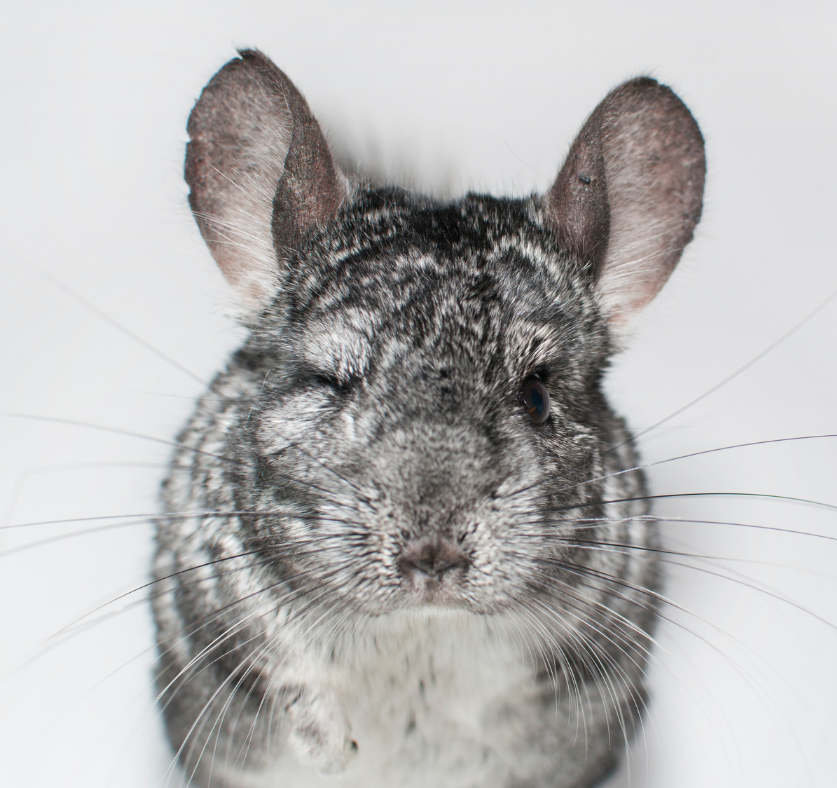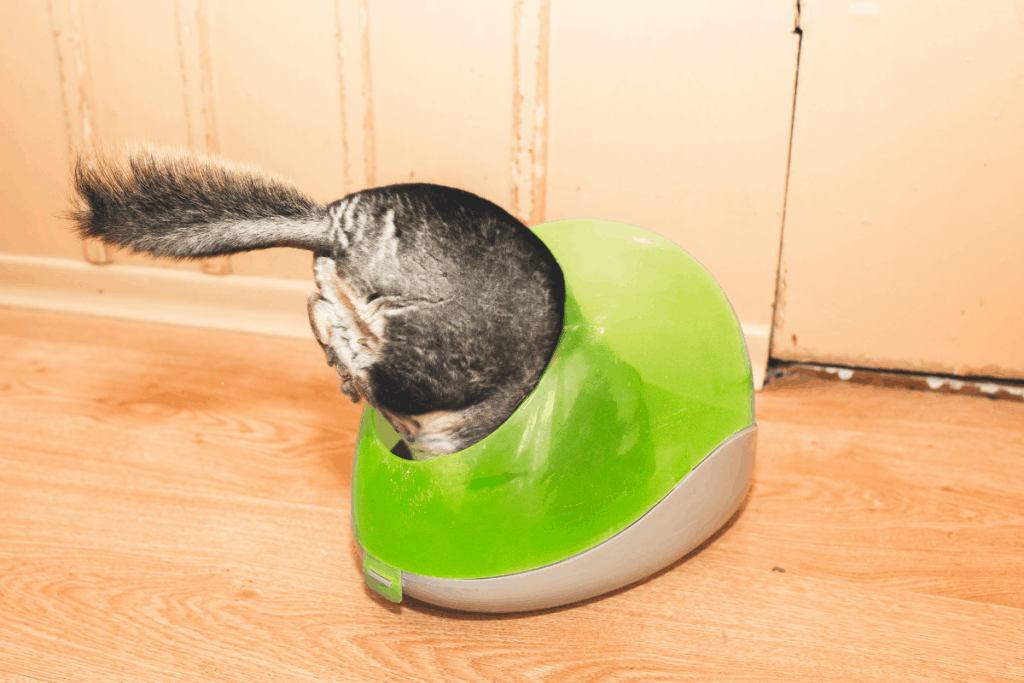Occasional sneezes are often caused by changes in the environment and are therefore no need to worry. However, sneezing can also indicate serious illnesses, particularly when experienced in combination with other symptoms.
So, although chinchillas look cute in the middle of a sneezing frenzy, it really shouldn’t be ignored, as they may need prompt veterinary attention.
Chinchillas sneeze most often due to dust, or other irritants in their environment. However it could also be an indicator of illness, so it’s important to seek veterinary attention if there are other symptoms, or if sneezing persists after changing the environment.
Sneezing is one of the primary symptoms of a range of conditions, and although there is a chance that your chinchilla is simply experiencing irritation from its local environment, it can become severe, and even fatal if it’s caused by something more serious and is left untreated.
I’ve gathered everything you need to know about chinchillas sneezing and how to handle it, in order to make sure your furry companion remains happy and healthy.
- Why Is My Chinchilla Sneezing?
- How Do I Know if My Chinchilla is Healthy?
- Can Chinchillas Have Allergies?
- Can Chinchillas Get Respiratory Infections?
- What Are the Different Types of Respiratory Infection?
- What is Chinchilla Pneumonia – Is It Serious?
- What Factors Contribute to Chinchillas Getting Pneumonia?
Why Is My Chinchilla Sneezing?

There are a wide range of reasons why your chinchilla might be sneezing, and these causes vary in severity, ranging from slightly irritated senses to potentially fatal outcomes.
The degree of severity may be indicated by the amount of sneezing, when and where it occurs, as well as whether or not your chinchilla is experiencing other symptoms, or struggles to breathe in combination with the sneezing.
How Do I Know if My Chinchilla is Healthy?
Healthy chinchillas should have bright eyes, alert expressions, a healthy appetite. and generate a lot of dry feces. They should be agile and energetic, and move around fairly often, with an excited reaction to feeding (or treat) time.
Initial indications of illness will vary depending on the condition, but changes in droppings, appetite, or overall activity should be monitored, and a vet should be consulted if you notice any sudden changes or odd behaviors.
Unfortunately, like most prey animals, chinchillas are naturally adept in disguising ill health, which can make picking up changes in behavior quite challenging.
But detecting odd traits is much easier if you know what to look for, so it’s best to get into the habit of checking the fundamentals (poop, food, activity) regularly.
If at any time you notice any of the following, you should contact your vet immediately:
- They appear lethargic
- They’re not eating or drinking normally, or show decreased appetite
- They don’t seem to be interested in exercise/leaving the cage
- They appear to have difficulty breathing
- You can hear them wheezing
Can Chinchillas Have Allergies?
Chinchillas can have allergies, in the same way that humans, and other animals do, and this could be a cause for sneezing depending on the conditions.

There may be factors within the environment that can cause your chinchilla some nasal irritation, including dust, pollen, food, or even perfume/other household fragrances which irritate, and trigger reflexive sneezes.
Their immediate environment plays a big part in their likelihood of developing allergies – cage bedding, dust baths, and air quality are the prime culprits.
Bedding
Bedding material should be unscented, and as natural as possible. Wood shavings or wood-based cat litter are good choices, as is just plain newspaper if you plan to change it daily.
However, some wood shavings are more irritating than others – pine and cedar, for example, contain more dust, and have oils that are classed as irritants .
.
If you have changed the bedding, and notice your chinchilla sneezing, then try newspaper for a couple of days and see if the sneezing continues. If it resolves, then your chin may be allergic to something in the bedding, so it’s time to change brand or bedding-type.
If that still doesn’t help, then it’s time to consult your vet to see if they can identify what the chin is allergic to, and establish a management plan going forward.
Dust baths

Dust bathing itself is usually a vigorous activity, and the dust goes everywhere. Because it is so fine, the dust can get up the chinchilla’s nose – causing sneezing.
So, although this isn’t an allergy, the dust itself could be the cause of the sneezing – this is completely normal and should stop in just a few sneezes.
Enclosed dust baths may help, as they keep the dust contained.
In the wild, chinchillas would bathe in volcanic ash, but in captivity, we have to replicate this as closely as possible with specialist dust that is produced just for chinchillas.
Unfortunately, some of the dust types available are not as pure as they could be, and so may cause allergies. Ideally, you should look for a specialist, fine chinchilla dust with good reviews, but never ever use sand.
If the symptoms only occur after dust bathing, then try a different brand/type of dust as they may just be sensitive to that particular one.
Can Chinchillas Get Respiratory Infections?
Chinchillas can get respiratory infections, such as colds, and other viruses. These infections if left untreated can spread to the chest, and could be fatal.
They can be viral or bacterial, and enter the chinchilla’s system via the nose or mouth. Luckily, chinchillas are not particularly susceptible to diseases, but they can pick up coughs, colds, and flu-type diseases from the environment, in a similar way to us.
These can then be transmitted from one chinchilla to another, so if you have multiple chinchillas, this needs to be monitored very carefully, and you may need to quarantine the sick chinchilla.
Your chinchilla may also have a sore throat, headache, a high temperature (fever), or muscle aches, but you’d never be able to tell. So, we have to monitor the signs we can see in chinchillas – sneezing, runny nose, watery eyes, coughing, breathlessness, wheezing, or lethargy.
What Are the Different Types of Respiratory Infection?
Upper respiratory tract infections: this refers to infections situated in the nasal cavities, sinus, back of the nose and throat – basically anywhere above the lungs that is involved with breathing.
Viral and bacterial infections here are similar to the coughs and colds that we humans experience, and are commonly identified by sneezing, coughing, watery eyes, and runny noses. This type of infection is not usually fatal if treated well, but does require veterinary attention.
Lower respiratory tract infections – also called Chest Infections: these are when the infection moves down into the lungs or large airways. These are much more serious, and are often accompanied by lethargy, wheezing, and breathlessness. This is because the lungs fill up with fluid, making breathing incredibly difficult.
This type of infection can be fatal, and a vet should be seen immediately if you notice lethargy, wheezing, or breathing difficulties. Chest infections can also go on to cause pneumonia.
In all of these circumstances, this is a time to talk to your vet to discuss the best way to treat and manage their infection.
What is Chinchilla Pneumonia – Is It Serious?
Pneumonia is one of the most serious diseases that chinchillas can get, and is often fatal. Specifically, pneumonia is swelling (inflammation) of the tissue in one or both lungs, and it’s usually caused by a bacterial infection (but can sometimes be caused by a virus).
The symptoms are extreme wheezing and shortness of breath as the chinchilla tries to get air into its lungs. Unfortunately, due to the fluid and the swollen lung tissue, this is nearly impossible, and without veterinary attention, this will be fatal.
Fortunately, with vigilance, pneumonia can be avoided before it ever gets to this point.
What Factors Contribute to Chinchillas Getting Pneumonia?
The likelihood and severity of any infection will be affected by their immediate environment, and the following should be considered:
Cage conditions
Where your chinchilla sleeps plays a massive role in the chances of them becoming ill. Bacteria love warm, damp conditions, so if you use cloth bedding or fleece, ensure it is not damp, as bacteria will multiply much faster here, increasing the odds of sickness.
Bedding which has been spoiled by wet feces is also dangerous, as countless bacteria are present in fecal matter (normal chinchilla poop is dry, and not generally a problem). Cramped cages also accelerate the spread of infections between all of the animals.
Humidity
If there is dirty bedding, and bacteria present, then excess humidity will make it easier for the bacteria to enter the lungs of the chinchilla.
Creating a clean, dry, and hygienic habitat will greatly decrease the chance of illness, and assist in your chinchilla’s recovery if they do become ill.
Immune system
Even in optimal conditions, however, it’s still possible for chinchillas to contract viruses and develop infections. How vulnerable your chinchilla will be to infection is based on their immune system, and factors that affect the immune systems include:
Age – very young, or very old animals (chinchillas are no different) are more susceptible to infection, as they have lowered immune systems.
Other illness – any chinchilla with a pre-existing condition may be more likely to pick up infections, especially if they have a compromised immune system.
Stress – if an animal is stressed, this places an increased burden on the immune system, making it harder to fight off infection.
Pregnancy – this is very stressful on the mother, and again can lead to increased susceptibility to disease.
In summary, if your chinchilla is experiencing any of the other symptoms (discussed above) in addition to sneezing, then you should contact your vet as soon as possible. If the sneezing is transient, or not associated with any other symptoms, you should try to determine if allergies or dust is the problem, and contact the vet if sneezing persists.
